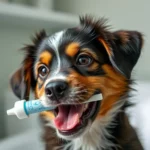
Introduction
Havanese dogs are small, affectionate companions known for their lively personality and charming appearance. As a toy breed, they typically weigh between 7 to 13 pounds, with a silky, flowing coat that requires regular grooming. Owning a Havanese means not only enjoying their playful nature but also being responsible for their health care. Understanding Havanese health issues is vital for any dog owner, as it enables you to spot problems early and maintain your furry friend’s well-being.
Understanding Havanese Breed Characteristics
Physical Traits
Havanese are small dogs with a sturdy build, standing about 8.5 to 11.5 inches tall at the shoulder. Their weight ranges from 7 to 13 pounds, making them ideal for both apartments and homes with yards. One of their most striking features is their long, flowing coat, which can be found in various colors, including white, black, and brown. Their coat requires regular grooming — brushing at least twice a week — to prevent matting and skin issues.
Temperament and Behavior
Havanese dogs are known for their friendly and outgoing nature. They are intelligent, eager to please, and thrive on human interaction, making them excellent family pets. Socialization is crucial for this breed, as it helps them develop into well-rounded adults. Early training and exposure to various environments will ensure that your Havanese is confident and well-mannered.
Common Health Issues in Havanese Dogs
Genetic Health Problems
Like many breeds, Havanese dogs can be predisposed to certain genetic conditions. Responsible breeding practices are essential to minimize these risks. Potential hereditary issues include hip dysplasia and various eye conditions. When choosing a Havanese puppy, it’s important to select a reputable breeder who screens for these issues.
Eye Conditions
Havanese dogs are susceptible to several eye conditions, which can affect their quality of life:
-
Cataracts: This condition causes cloudiness in the lens of the eye, leading to vision impairment. Symptoms may include difficulty seeing in low light and increased sensitivity to bright light.
-
Progressive Retinal Atrophy (PRA): A genetic condition that leads to the degeneration of retinal cells, PRA can result in night blindness and eventual vision loss.
-
Corneal Dystrophy: This involves the accumulation of material in the cornea, leading to cloudiness and discomfort. Treatment options vary based on severity.
Hip and Joint Issues
Hip dysplasia is another concern for Havanese dogs. This hereditary condition occurs when the hip joint doesn’t fit into the hip socket properly, leading to arthritis and pain. Regular veterinary check-ups can help identify this issue early.
Luxating patella, or dislocated kneecap, is another common ailment in Havanese. Affected dogs may show signs of limping or reluctance to jump or run. Treatment can range from monitoring to surgical intervention, depending on severity.
Skin Conditions
Havanese can experience various skin problems, often stemming from allergies or infections:
-
Allergies: Food allergies or environmental allergens (like pollen) can cause itching, redness, and skin infections. Identifying and eliminating the allergen is crucial.
-
Hot Spots: These are localized areas of inflammation and infection on the skin, often resulting from excessive licking or scratching. Treatment typically involves cleaning the area and possibly using antibiotics.
Dental Health
Dental care is vital for Havanese dogs. They are prone to periodontal disease, which can lead to tooth loss and other health issues. Regular brushing and dental check-ups are essential for maintaining their oral health.
Other Common Ailments
Havanese dogs can also face other health issues, including:
-
Ear Infections: Their floppy ears can trap moisture, leading to infections. Regular ear cleaning can help prevent this issue.
-
Obesity: This breed is prone to weight gain, which can exacerbate other health issues. Maintaining a balanced diet and regular exercise is crucial for keeping your Havanese at a healthy weight.
Preventive Health Care for Havanese Dogs
Regular Veterinary Check-ups
Routine veterinary visits play a vital role in maintaining your Havanese’s health. Regular examinations can help identify potential issues before they become serious. Vaccination schedules should be strictly followed to keep your dog protected from various diseases.
Nutrition and Diet
Providing a balanced diet is essential for your Havanese’s health. A high-quality dog food that meets their nutritional needs is crucial. Look for foods that list meat as the first ingredient and avoid fillers such as corn and soy. Consult your veterinarian for specific dietary recommendations, especially if your dog has health issues or food sensitivities.
Exercise Requirements
Havanese dogs are energetic and require daily exercise to stay healthy. Aim for at least 30 minutes of activity each day. Fun activities include walks, playtime, and interactive games that stimulate both their body and mind. Regular exercise helps prevent obesity and keeps their joints healthy.
Grooming and Hygiene
Due to their long, luxurious coats, Havanese dogs require regular grooming. Brush them at least twice a week to prevent matting and skin issues. Bathing should occur every few weeks, but not too frequently, as it can strip natural oils from their skin. Additionally, regular ear cleaning and nail trimming are essential for maintaining hygiene and preventing infections.
Recognizing Signs of Illness
Behavioral Changes
Being aware of changes in your Havanese’s behavior can help you spot potential health issues early. Look for signs such as:
- Changes in appetite
- Decreased energy levels
- Unusual vocalizations or reluctance to engage in activities
If you notice significant changes, it’s advisable to consult your veterinarian.
Physical Symptoms
Common physical signs of illness in Havanese dogs include:
- Vomiting or diarrhea
- Coughing or difficulty breathing
- Unexplained weight loss or gain
If these symptoms persist, seeking veterinary care is essential to determine the underlying cause.
Treatment Options for Havanese Health Issues
Conventional Treatments
Conventional veterinary treatments often involve medications or surgical options. Depending on the diagnosis, your veterinarian may prescribe anti-inflammatory medications, antibiotics, or pain relief. Surgical options may be necessary for severe cases, such as hip dysplasia or luxating patella. Always follow your veterinarian’s advice regarding treatment plans and medications.
Alternative Therapies
Some Havanese owners explore alternative therapies to complement conventional treatment. Holistic approaches, such as acupuncture and chiropractic care, can provide relief and promote overall well-being. Additionally, dietary supplements, including omega-3 fatty acids and probiotics, can support health and alleviate certain conditions. Always discuss these options with your veterinarian before starting any new treatment.
Conclusion
Understanding Havanese health issues is crucial for ensuring a long, happy life for your furry friend. From genetic predispositions to common ailments, being informed allows you to take proactive steps in maintaining their health. Regular veterinary visits, a balanced diet, consistent exercise, and proper grooming are all vital components of a comprehensive health care plan. By prioritizing your Havanese’s health, you can foster a loving, joyful environment where they thrive.
FAQs
What are the most common health issues in Havanese dogs?
Havanese dogs are prone to several health problems, including eye conditions (like cataracts and PRA), hip dysplasia, skin allergies, and dental issues.
How can I prevent health issues in my Havanese?
Regular veterinary check-ups, a balanced diet, daily exercise, and proper grooming are essential for preventing health issues in Havanese dogs.
What signs should I look for if I suspect my Havanese is ill?
Look for changes in behavior, such as reduced energy or appetite, as well as physical symptoms like vomiting, diarrhea, or unusual coughing.
Are there specific foods that Havanese should avoid?
Havanese should avoid foods high in fillers like corn and soy, as well as human foods that are toxic to dogs, such as chocolate, onions, and grapes.
When should I take my Havanese to the vet?
If you notice any unusual behavior or persistent physical symptoms, it’s essential to seek veterinary care promptly to determine the cause and get appropriate treatment.









